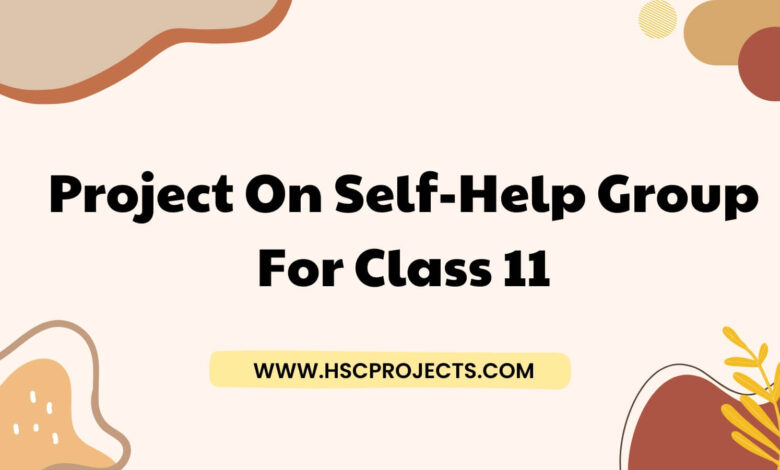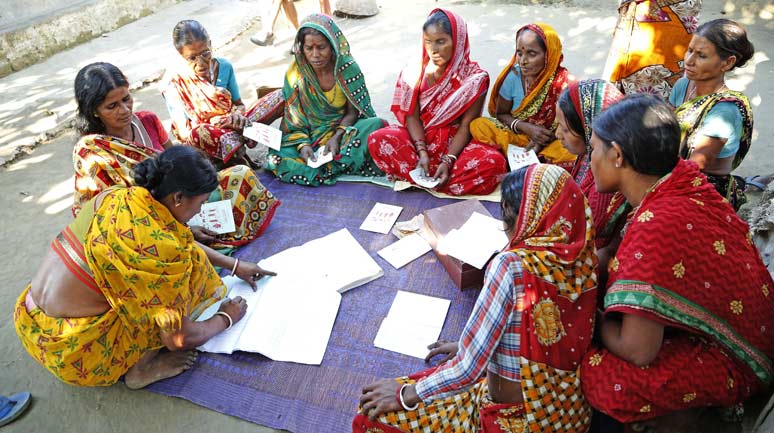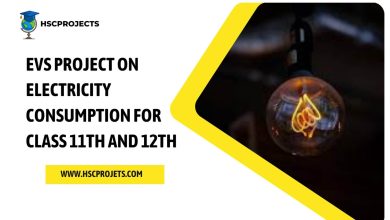
Project On Self-Help Group For Class 11
Acknowledgment
My greatest gratitude goes out to everyone who has supported and assisted me in finishing my study on self-help groups. First of all, I want to express my gratitude to my project manager for assisting me with my research and writing. Their insightful opinions and helpful suggestions have been crucial in determining this project’s course.
I also want to express my gratitude to the self-help group participants who so kindly gave of their time and shared their stories with me. Their experiences have offered insightful perspectives into the operation of self-help groups and the advantages they offer to their members.
Finally, I’d want to thank my friends and family for their encouragement and support, which have given me the drive to see this project through to the end. Their continuous support has been crucial in assisting me in overcoming the obstacles and problems that I faced while working on this project.
Introduction To Self-help Groups

Self-help groups are unpaid associations of people who join together to share their knowledge, skills, and experiences in order to solve a shared issue or problem. People who share troubles with addiction, mental health conditions, or money problems frequently create these organisations.
Self-help organisations’ main goal is to give their members support and encouragement from one another. Members of self-help groups can develop a sense of community and belonging by sharing their experiences, which also gives them the confidence to take charge of their life.
Self-help organisations frequently function at the local level, with members assuming leadership positions and planning activities and events. This bottom-up strategy encourages members to feel ownership and accountability, which can result in better decision- and problem-solving.
Self-help groups come in a variety of shapes and sizes, from unstructured, social get-togethers of friends and neighbours to formal organisations with bylaws and elected officers. Whatever their structure, self-help organisations share the conviction that peer assistance has the ability to positively impact both individuals and communities.
In this assignment, we’ll look at the history and development of self-help organisations, as well as the advantages they offer to their members and the difficulties they encounter in accomplishing their objectives. Additionally, we’ll look at the contribution that self-help organisations make to social and communal advancement as well as the area’s potential for future development and innovation.
The Importance Of Self-help Groups In Community Development
Self-help organisations are essential for fostering social and local development. Self-help organisations can contribute to the development of stronger, more resilient communities by giving people a venue to come together and share their experiences and knowledge.
Self-help groups give their members a sense of community and belonging, which is one of their main advantages. People who may feel alone or marginalised as a result of their circumstances or experiences may find this sense of connectedness to be especially crucial. Self-help groups can aid in reducing social isolation and fostering stronger social networks by providing a safe space where participants can discuss their struggles and victories.
Self-help organisations can be crucial in fostering economic growth. Many self-help organisations place a strong emphasis on entrepreneurship and small company growth, giving their members the tools and support they need to launch and grow profitable firms. Self-help organisations can help to create jobs and enhance the economic well-being of their communities by promoting local economic activity.
Self-help organisations can enhance social and economic growth as well as improve health results. Addiction, mental health, and chronic illnesses are among the health-related issues that are the focus of many self-help organisations. Self-help groups can contribute to bettering the health outcomes for their members by offering peer support and exchanging knowledge about management and treatment techniques.
In general, self-help groups are a crucial resource for fostering neighbourhood development. Self-help organisations can contribute to the development of stronger, more resilient communities that are better prepared to address present and future challenges by creating social connections, stimulating economic activity, and improving health outcomes.
History And Evolution Of Self-help Groups
Self-help organisations have a rich and illustrious past that dates back to the early 19th century. The Washington Total Abstinence Society, one of the earliest known self-help organisations, was established in 1840 by a group of alcoholics who banded together to encourage one another in their attempts to stop drinking.
With the rise of organisations concentrating on problems like mental health, addiction, and chronic illness, the self-help movement gained traction in the 20th century. One of the most well-known instances of a self-help group is the Alcoholics Anonymous programme, which was established in 1935. The 12-step method of rehabilitation used in the programme has now been adopted by numerous other organisations and has grown to be a pillar of the self-help movement.
Self-help organisations have developed in recent years to address a variety of difficulties, from parenting to environmental advocacy. Today, a lot of self-help organisations connect their members from all over the world via internet platforms, enabling easier access to information and support.
Self-help organisations are diverse, yet they all adhere to the same set of beliefs and ideals. These include the value of peer support, the conviction that knowledge and experience gained from one’s own experiences are powerful, and a dedication to helping others and empowering oneself.
Self-help organisations are still crucial in today’s society for tackling social and communal problems because they give people a forum to join together and alter their own lives and the world around them.
Types Of Self-help Groups
Self-help groups come in a variety of shapes and sizes, each focusing on a particular topic or collection of difficulties. The following are a few of the popular kinds of self-help groups:
Addiction Recovery Groups: These organisations are dedicated to assisting those who are struggling with drug or alcohol addiction. Examples include SMART Recovery, Narcotics Anonymous, and Alcoholics Anonymous.
Mental health support groups: These organisations offer assistance and information to people who are coping with mental health problems including depression, anxiety, or bipolar disorder. Examples include the Depression and Bipolar Support Alliance (DBSA) and the National Alliance on Mental Illness (NAMI).
Chronic Illness Support Groups: Those with chronic illnesses like diabetes, cancer, or multiple sclerosis can find support and resources in chronic illness support groups, which are devoted to doing just that. The National Multiple Sclerosis Society and the American Cancer Society are two examples.
Carer Support Groups: These organisations offer assistance and resources to people who are looking after a family member who has a chronic disease or handicap. The Alzheimer’s Association and the Family Carer Alliance are two examples.
Parenting Assistance Groups: These organisations offer resources and assistance to parents coping with the difficulties of childrearing. Mothers of Preschoolers (MOPS) and Parents Anonymous are a couple of examples.
Environmental Activism Groups: These organisations are dedicated to advancing environmental activism and sustainability. The Sierra Club and Greenpeace are two examples.
These are just a few sorts of self-help groups that are available. It’s crucial to remember that self-help groups can be arranged around certain interests, hobbies, or activities as well as specific demographics like gender, race, or sexual orientation. A helpful and accepting environment where members may share their experiences and knowledge to bring about positive change is essential for a self-help group to be successful.
Formation And Management Of Self-help Groups
Creating a self-help group can be a highly effective strategy to address both communal and personal difficulties. Here are some procedures to take into account when creating and running a self-help group:
Identify the issue: The first stage in starting a self-help group is to decide which issue—if any—the group will concentrate on. This might be anything from environmental action to addiction recovery.
Find like-minded people: Once the problem has been identified, it’s critical to track down others who are eager to establish a group and who are also concerned about the same things. You can achieve this by use your own networks, social media, or neighbourhood associations.
Define the purpose and objectives: Prior to the group’s start, it is crucial to specify its purpose and objectives. This can entail formulating a mission statement, establishing goals, and detailing the tasks and solutions the team will offer.
Establish the group structure: Self-help groups can take on a variety of shapes, so it’s critical to choose the one that will best serve your group. This could include a facilitator or leader, set meeting times and places, and a process for making decisions.
Create an action plan: After the group is created, it is crucial to create an action plan. This can entail establishing up forums or online tools, contacting neighbourhood leaders, or planning events or activities.
Ensure sustainability: To guarantee the group’s long-term success, it’s crucial to set up a mechanism for handling finances, recruiting new members, and resolving any potential conflicts or problems.
It can be difficult to run a self-help group, but if you follow these guidelines and remain dedicated to the organization’s mission and objectives, you can build a strong community that benefits both its members and the community at large.
Benefits And Challenges Of Self-help Groups
Self-help groups can benefit people and communities in many ways, but they also come with some difficulties. The following are some of the most typical advantages and drawbacks of self-help groups:
Benefits:
Social Support: Self-help groups can give people access to a caring community of people who have similar interests and problems.
Empowerment: Self-help group participants might feel in control of their life and empowered by actively participating in their own recovery or growth.
Resources and Information: Self-help groups can give their members access to specialists, instructional materials, and links to other support agencies, among other essential tools and information.
Reduced Stigma: Self-help group participants can contribute to a reduction in the stigma attached to particular conditions or behaviours by freely addressing personal difficulties and experiences.
Improved Mental Health: Participating in self-help groups has been associated with improved mental health outcomes, including a decrease in the signs and symptoms of despair and anxiety.
Challenges:
Limited Resources: Members’ access to resources may be restricted by the self-help groups’ frequent reliance on meagre funding.
Absence of Professional Support: While self-help groups can be useful resources for knowledge and support, they cannot replace medical treatment or therapy.
Group Dynamics: Self-help group leaders may find it difficult to control group dynamics, such as disputes or confrontations amongst group members.
Burnout: Self-help group participants and leaders may become emotionally exhausted from supporting one another and running the group.
Inclusivity: Self-help organizations that concentrate on issues of race, gender, or sexuality may find it difficult to maintain an inclusive environment for all of their participants.
Self-help groups continue to be an effective instrument for fostering personal and societal growth despite these obstacles. Self-help organisations enable people to realise their goals and make a positive impact on the world by offering a friendly and empowering atmosphere.
Success Stories Of Self-help Groups
Self-help organisations have had a big impact on people and communities all over the world. A few examples of self-help group successes are as follows:
Alcoholics Anonymous (AA): One of the oldest and most well-known self-help organisations in the world is Alcoholics Anonymous (AA). Founded in 1935, AA offers assistance to people battling alcohol addiction. Numerous people have found sobriety and improved their lives thanks to AA’s 12-step programme and peer support.
Grameen Bank: Muhammad Yunus, the 1983 Nobel Peace Prize winner, established Grameen Bank as a microfinance institution in Bangladesh. People who do not have access to standard banking services might get minor loans through the bank. Millions of people have been helped out of poverty by Grameen Bank by giving them the tools they need to launch their own enterprises.
Breast Cancer Support Groups: Women can interact with others who are going through comparable problems in a safe and encouraging environment by participating in breast cancer support groups. Participating in breast cancer support groups has been linked to better outcomes for survivors’ mental health and quality of life, according to research.
Self-Help Groups for Mental Health: Self-help groups for mental health offer those with disorders including depression, anxiety, and bipolar disorder a supportive environment. For anyone who might feel alone or stigmatised, these groups can offer invaluable resources and support.
Farmer Producer Organizations: Farmer Producer Organisations (FPOs) are self-help organisations that offer resources and support to small-scale farmers in developing nations. FPOs can assist farmers in boosting their yields and improving their living conditions by combining their resources and skills.
These success tales demonstrate the ability of self-help organisations to improve lives and communities. Self-help groups can assist people in achieving their objectives and improving their lives by offering a friendly and empowering environment.
Role Of Government And Non-governmental Organizations In Supporting Self-help Groups
Government and non-governmental organisations (NGOs) assist the creation and administration of self-help groups in a significant way. Governments and NGOs can help self-help organisations in the following ways:
Funding: Governments and NGOs may contribute money to help self-help groups get started and run effectively. Members of the group may receive resources, instruction, and other forms of support thanks to this financing.
Building Capacity: Self-help group leaders and members can receive training and capacity building from governments and NGOs. Training in group management, financial management, and other pertinent subjects can fall under this category.
Policy Support: Governments have the power to enact laws and regulations that facilitate the establishment and operation of self-help organisations. This can include regulations governing financial access, the legitimacy of self-help organisations, and other types of assistance.
Partnership: Governments and NGOs can work together to support and resource self-help organisations. Partnerships that give access to healthcare, education, and other support services are examples of this.
Advocacy: Governments and NGOs can fight for the rights of self-help organisations and the people who belong to them. This can involve arguing for laws and policies that assist self-help organisations as well as arguing for increased respect and support for the crucial job carried out by these organisations.
Government and non-governmental organisation support can be extremely important to the success of self-help groups. Governments and NGOs can assist self-help groups in achieving their objectives and bettering the lives of their members and communities by providing money, capacity building, policy assistance, collaborations, and lobbying.
Impact Of Self-help Groups On Women’s Empowerment

Self-help organisations have significantly contributed to the empowerment of women all over the world. Here are a few ways that self-help organisations have aided in the empowerment of women:
Economic Empowerment: Self-help groups give women access to training and financial resources, empowering them to launch their own enterprises and achieve financial independence. Increased control over their lives and increased decision-making capacity may result from this economic empowerment.
Social Empowerment: Self-help groups offer women a friendly and empowered environment, which can encourage the development of self-esteem and social networks. Through overcoming societal hurdles and gaining more respect and recognition in their communities, this can assist women.
Political Empowerment: Self-help organisations can give women a forum to express their issues and fight for their rights. This may result in more women participating in politics and being represented in the decision-making process.
Health Empowerment: Self-help groups can give women access to healthcare resources and education, giving them the ability to take charge of their own health and welfare.
Education Empowerment: Self-help groups can give women access to education and training, empowering them to pursue new opportunities and acquire new skills.
Self-help organisations have, in general, been extremely important in empowering women all around the world. Self-help groups can assist women in overcoming social, economic, and political hurdles and achieving greater empowerment and independence by giving them access to resources, training, and community support.
Future Prospects Of Self-help Groups
Self-help organisations have shown to be a successful instrument for fostering community growth, and they appear to have a promising future. These anticipated changes for self-help groups in the future are listed below:
Technology Use: Self-help groups can use technology to increase productivity, communication, and access to resources. For instance, social media can be used to interact with other organisations and share resources, while mobile apps can be utilised to deliver training and financial management tools.
Expansion into New Sectors: Self-help organisations have typically concentrated on agriculture and microfinance, although there is room for growth into other industries. Self-help organisations, for instance, could be utilised to promote projects for sustainable development like water management and renewable energy.
Collaboration with Formal Financial Institutions: Self-help organisations have long been shut out of the formal financial system, yet there is room for cooperation with banks and other financial institutions. Self-help organisations may have easier access to finance and other financial resources as a result.
Scaling Up: Self-help projects have traditionally been small-scale, but there is potential for scaling them up to have a bigger impact. In order to do this, networks of self-help groups may be established or self-help group models may be included into broader development initiatives.
Recognition and Support: Self-help groups have frequently been disregarded by governments and other development actors, but there is rising understanding of their significance. Self-help groups can have even greater effect and sustainability with more recognition and backing.
The future of self-help groups appears bright overall. Self-help organisations can continue to have a large impact with the use of technology, growth into new industries, cooperation with formal financial institutions, scaling up, and increased recognition and backing.
Conclusion
Self-help groups have become a potent tool for community empowerment and development, especially for vulnerable and marginalised people. Self-help groups have assisted people and communities in achieving greater economic, social, and political empowerment via access to resources, training, and community support.
Although self-help organisations have a variety of difficulties, such as sustainability, resource access, and integration into official systems, there are also plenty of chances for growth and development. Self-help organisations can continue to make a substantial contribution to community development and empowerment with the use of technology, growth into new areas, partnership with formal financial institutions, scaling up, and increased recognition and support.
It is impossible to exaggerate the role that self-help groups play in the development of communities. Self-help organisations can contribute to the development of more resilient, equitable, and successful communities by giving people and communities the resources and tools they need to become self-sufficient and empowered. As a result, self-help groups are a crucial component of sustainable development, and governments, non-governmental organisations, and other development actors must continue to support and invest in them.
Certificate of Completion
I, [Your Name], a student of Class 11 at [Your School Name], am pleased to present my project on “Self-Help Groups. ” This project explores the significance of self-help groups in community development, their history and evolution, different types of self-help groups, their formation and management, benefits and challenges they face, and their impact on women’s empowerment. Additionally, the project delves into the role of government and non-governmental organizations (NGOs) in supporting self-help groups and presents future prospects for these organizations.
I express my heartfelt gratitude to my project manager for their guidance and mentorship throughout the research and writing process. Their valuable insights and suggestions have greatly contributed to the success of this project.
I am deeply thankful to the participants of the self-help groups who generously shared their experiences and stories with me. Their openness has provided valuable perspectives and enriched the understanding of the significance and impact of self-help groups.
I would also like to extend my gratitude to my friends and family for their continuous support and encouragement. Their belief in my abilities motivated me to overcome challenges and complete this project successfully.
The project allowed me to gain a deeper understanding of self-help groups and their role in fostering community development and empowerment. By studying various types of self-help groups, their benefits, challenges, and impact on women’s empowerment, I have learned how these organizations positively influence individuals and communities.
I hope this project serves as a valuable resource for anyone interested in learning about self-help groups and their contribution to social and community development.
Date: [Date of Completion][Your Name][Institution/Department Name]
In order to download the PDF, You must follow on Youtube. Once done, Click on Submit
Follow On YoutubeSubscribed? Click on Confirm
Download Project On Self-Help Group For Class 11 PDF






